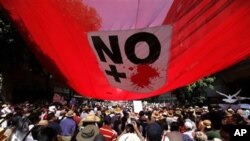Thousands of people marched into the Mexican capital, Mexico City, Sunday to demand an end to the bloodshed that has claimed nearly 40, 000 lives since President Calderon launched a war against organized crime four years ago.
Thousands of people marched into the Mexican capital, Mexico City, Sunday to demand an end to the bloodshed that has claimed nearly 40, 000 lives since President Calderon launched a war against organized crime four years ago.
Mexican poet Javier Sicilia, wearing a T-shirt with the photo of his slain son, led the silent trek that began Thursday in the resort city of Cuernavaca in the central state of Morelos. Along the way, hundreds of people of all ages joined the 90 kilometer march chanting slogans to stop the violence between the government and warring drug gangs.
Despite the deployment of thousands of security forces to drug hotspots across the country in 2006, the level of violence has not decreased.
Last week, 11 more bodies were found at a series of mass graves in the town of Durango, bringing the number of bodies to 157. In the state of Tamaulipas, 183 bodies have been pulled from mass graves. Many of the victims are believed to have been taken from passenger buses.
Human rights leader Edgar Cortes, who participated in the march, called it the broadest to date, having brought together a wide sector of civil society that has been affected by the economic crisis and the increased level of violence.
Student Miriam Lopez said she came to Sunday's demonstration because she was tired of all the killings and wanted a better future for young people, like herself.
She says she felt if she did not act now, others would be killed. She says she wants to help bring about the change her country so desperately needs.
Relatives carried signs with photos of family members - victims of the wave of violence that has swept the country.
On Saturday at a rally at the national university, where marchers spent the night, the father of Adriana Morlet spoke about how his daughter, an architecture student at the university, disappeared eight months before. He says his daughter went to the university library to check out a book and never returned. He says her disappearance has "shattered our lives, like a dagger digging into our hearts."
In Sunday's address, Mexican poet Javier Sicilia called for the resignation of Public Security Secretary Genaro Garcia Luna as a response to the popular discontent with the war. He criticized political parties for what he claimed was their collusion with drug traffickers. He said if the political parties do not reform themselves, Mexican citizens will ultimately be left to choose which drug cartel or political faction to vote for in next year's presidential elections.
Sicilia, whose own son was tortured and murdered along with six others last March in Cuernavaca, called for a national pact for peace, justice and dignity. He said this pact, among other things, would stop young people from being the victims of war or becoming the reserve army of the cartels.
The pact is expected to be signed in Juárez City, where an estimated 3,000 people were killed by violence last year.
At the end of Sunday's demonstration, Sicilia called for five minutes of silence in memory of the thousands of victims of the drug war that most Mexicans believe the government is losing.





